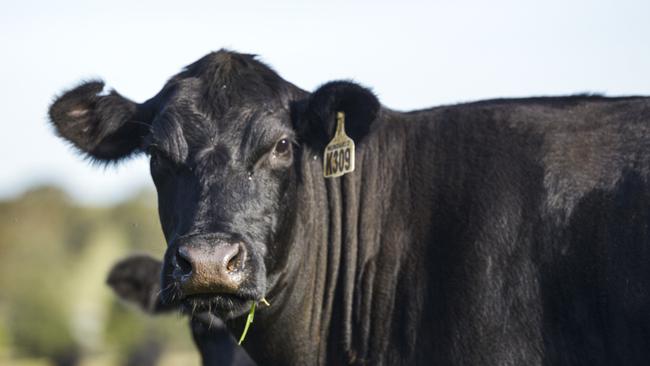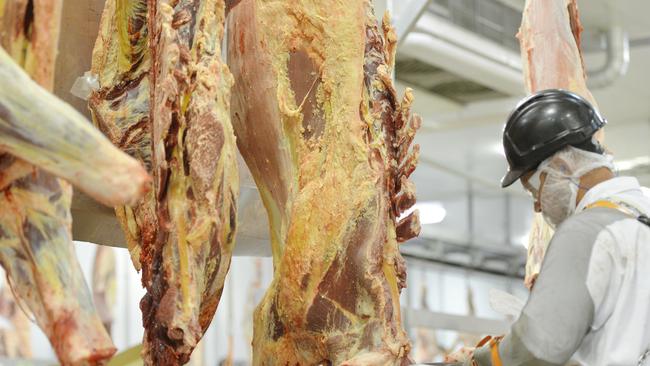China bans imports from 4 Australian abattoirs as trade tension rises
The government is denying that China’s meat ban is a tit-for-tat skirmish in what’s becoming a full-blown trade war with Australia.

Asian trade expert Dr Jeffrey Wilson says Chinese sanctions on Australian barley and beef are retaliation against Scott Morrison’s push for coronavirus inquiry, declaring the two countries are now “in a trade war”.
Dr Wilson, the research director at the Perth USAsia Centre, said the suspension of imports from four Queensland meat facilities for purported sanitary issues would disrupt about a third of Australia’s $3bn annual beef exports to China.
But trade Minister Simon Birmingham said Australia was “not in any sort of war” with China, as he tried to quell concerns Chinese trade actions against meat and barley exports were politically motivated.
China suspended meat imports from at least four Australian abattoirs overnight, as trade tensions between Australia and the communist nation rise.
The Australian understands the Kilcoy plant, Beef City in Toowoomba, the Dinmore meatworks in Brisbane and the Northern Co-operative Meat Company at Casino in NSW have been suspended by Chinese authorities. It has been confirmed that those four plants have not been officially delisted, and the four have not yet lost their licenses in China.
The Beef City and Dinmore plants are both owned by JBS Australia. The Australian has contacted Kilcoy, the Northern Co-operative Meat Company and JBS for comment.
The move follows China’s threats to slap a 73.6 per cent tariff on $1bn worth of Australian barley as early as this Sunday.
“This is unquestionably political retribution,” Dr Wilson said, noting China’s ambassador to Australia, Cheng Jingye, had recently threatened Chinese consumer boycotts of Australian beef.
“This is not about technical issues and arguments over trade policy. This is about diplomatic signalling and making a point. Australia now finds itself in a trade war.”
But Senator Birmingham on Tuesday said no political connections had been made by China to the suspension of four Australian abattoirs overnight, and denied a trade war had begun. “Australia is not in any sort of war. Our intentions to work as co-operatively as we can with our partners and across the world,” he said in China.
“Our export flows have been at incredibly strong levels.
“We continue to make representations at all levels we can with the Chinese government. Our approach is respond thoughtfully, carefully, methodically.
“That’s what we’ll do on these (trade matters) and on broader matters.”
Senator Birmingham earlier said the government was “concerned” by China’s actions, saying the government was notified late on Monday that the meat facilities had been suspended by Chinese officials over issues related to “labelling and health certificate requirements”.

“We are concerned that the suspensions appear to be based on highly technical issues, which in some cases date back more than a year,” he said.
‘Bashing’ farmers
Dr Wison said he expected further trade sanctions in the future as China pressed its political point against Australia, which has led the global call for an independent investigation into the coronavirus pandemic.
“Traditionally you would’ve expected sanctions on tourists and students, because that is something the Chinese government can manage through exit visas. But with the coronavirus, there are no tourists or students.
“So we are seeing agricultural sectors being hit.
“It probably won’t be iron or coal, because those things are critically important for China’s recovery. With beef and barley, there are alternate suppliers, particularly in Canada” he said.
“This is something the Chinese can sanction where the pain is on our side, not theirs. Whereas iron ore, coal and natural gas - that’s mutually assured destruction.”
Dr Wilson said China was misguided if it expected the Australian government to shift its position.
“The Australian government should not and I expect will not change its position as a result of this kind of stuff,” he said. “They are basically bashing the s*** out of Australian farmers - in both cases badly drought-affected for the last few years.
“If this is an attempt to kind of sway some parts of the Australian community against the government’s position, I suggest it will backfire terribly.”
He said the sectors were unfortunate victims of the government’s position and “I’d certainly encourage governments to find ways to give these guys a hand for taking a hit for the country as a whole”.
Meanwhile Australia’s top meat industry body vowed to continue working with China.
Australian Meat Industry Council chief executive Patrick Hutchinson said that China was basing the suspensions over labelling issues and they would try to work through any problems with both Australian and Chinese authorities.
“Australia remains as one of the world’s most reliable exporters throughout the COVID-19 period, faring exceptionally well due to the preparedness measures implemented by establishments,” Mr Morrison said.
“AMIC and its members are well aware that China has strict requirements for technical matters, including labelling, and the Australian meat industry takes these concerns exceptionally seriously.
“While not desirable, we have dealt with issues of this nature before and are working closely with the Commonwealth. This is a trade and market access issue that is being led by the Commonwealth.”
Industry sources have told The Australian that Chinese authorities are claiming that meat products coming in from Australia do not match the health certificates being provided.



To join the conversation, please log in. Don't have an account? Register
Join the conversation, you are commenting as Logout